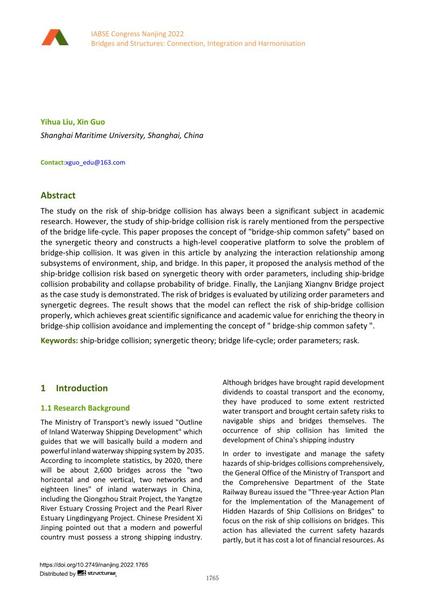Study on Risk of Ship Collision in Bridge Life-cycle Based on Synergetic Theory

|
|
|||||||||||
Détails bibliographiques
| Auteur(s): |
Yihua Liu
(Shanghai Maritime University, Shanghai, China)
Xin Guo (Shanghai Maritime University, Shanghai, China) |
||||
|---|---|---|---|---|---|
| Médium: | papier de conférence | ||||
| Langue(s): | anglais | ||||
| Conférence: | IABSE Congress: Bridges and Structures: Connection, Integration and Harmonisation, Nanjing, People's Republic of China, 21-23 September 2022 | ||||
| Publié dans: | IABSE Congress Nanjing 2022 | ||||
|
|||||
| Page(s): | 1765-1774 | ||||
| Nombre total de pages (du PDF): | 10 | ||||
| DOI: | 10.2749/nanjing.2022.1765 | ||||
| Abstrait: |
The study on the risk of ship-bridge collision has always been a significant subject in academic research. However, the study of ship-bridge collision risk is rarely mentioned from the perspective of the bridge life-cycle. This paper proposes the concept of "bridge-ship common safety" based on the synergetic theory and constructs a high-level cooperative platform to solve the problem of bridge-ship collision. It was given in this article by analyzing the interaction relationship among subsystems of environment, ship, and bridge. In this paper, it proposed the analysis method of the ship-bridge collision risk based on synergetic theory with order parameters, including ship-bridge collision probability and collapse probability of bridge. Finally, the Lanjiang Xiangnv Bridge project as the case study is demonstrated. The risk of bridges is evaluated by utilizing order parameters and synergetic degrees. The result shows that the model can reflect the risk of ship-bridge collision properly, which achieves great scientific significance and academic value for enriching the theory in bridge-ship collision avoidance and implementing the concept of " bridge-ship common safety ". |
||||
| Copyright: | © 2022 International Association for Bridge and Structural Engineering (IABSE) | ||||
| License: | Cette oeuvre ne peut être utilisée sans la permission de l'auteur ou détenteur des droits. |
||||
